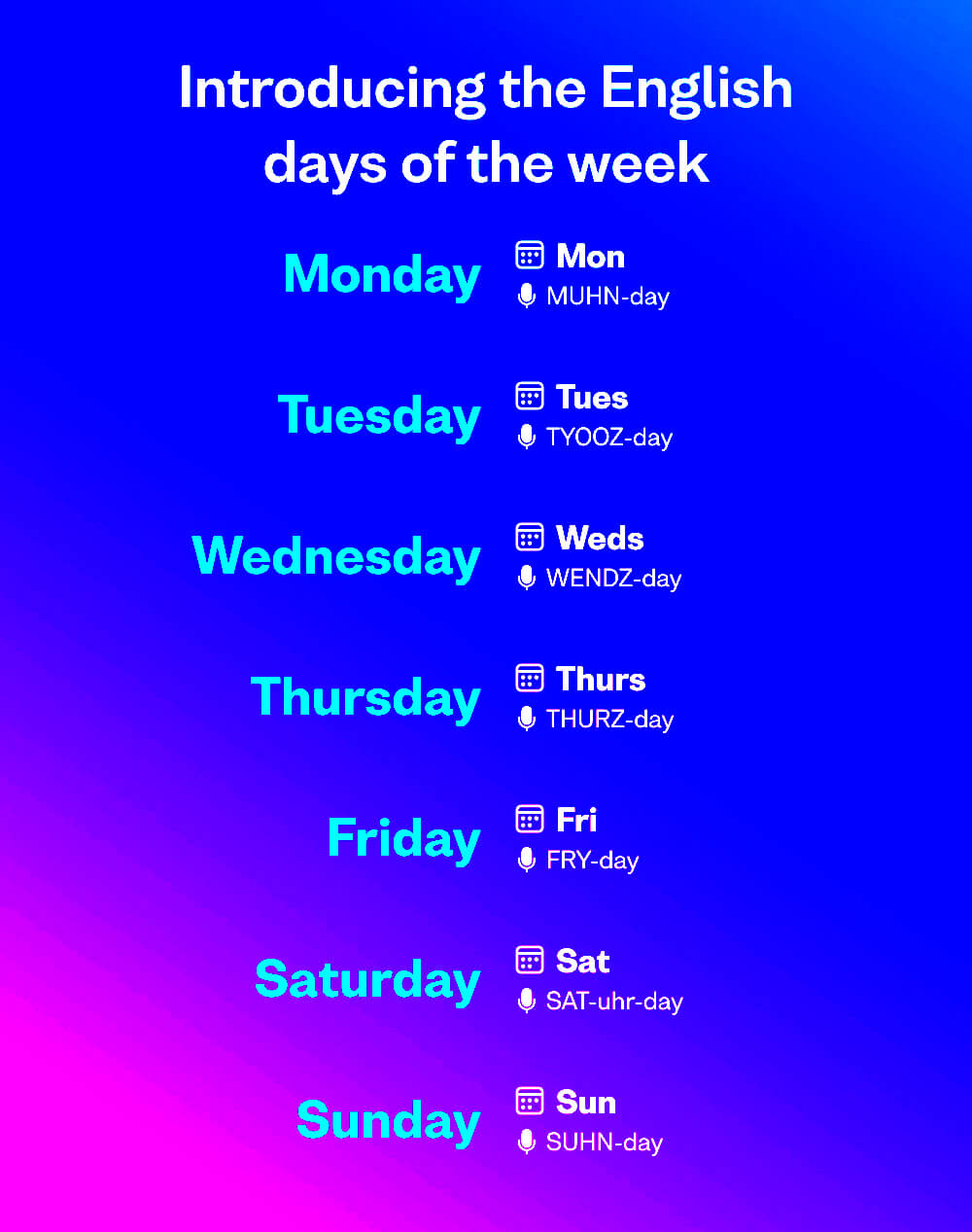Mastering the days of the week in English is essential for effective communication, whether you’re scheduling appointments, planning activities, or simply engaging in daily conversations. The days of the week help us structure our time and organize our lives, and understanding how to use them correctly can greatly improve your fluency. In this article, we’ll walk you through the days of the week, their pronunciation, spelling, and some common expressions that involve these days. Let’s get started!
The Days of the Week in English
In English, there are seven days of the week, each with a distinct name. Here’s a quick reference for the days of the week, their abbreviations, and pronunciations:
| Day | Abbreviation | Phonetic Pronunciation |
|---|---|---|
| Monday | Mon. | MUHN-day |
| Tuesday | Tues. | TYOOZ-day |
| Wednesday | Wed. | WENDZ-day |
| Thursday | Thurs. | THURZ-day |
| Friday | Fri. | FRY-day |
| Saturday | Sat. | SAT-uhr-day |
| Sunday | Sun. | SUHN-day |
Common Day-Related Terms
In addition to the days of the week, here are a few commonly used day-related terms that can help you in everyday conversations:
- Today: This present day.
- Yesterday: The day before today.
- Tomorrow: The day after today.
Frequently Asked Questions (FAQs) on Days of the Week in English
How Do You Pronounce Days?
The word “days” is pronounced as /dAYz/, or simply “dayz” in spoken English.

Do Days of the Week Get Capitalized in English?
Yes, days of the week are always capitalized in English.
How Do You Abbreviate Days of the Week in English?
Here are the common abbreviations for the days of the week:
- Monday: Mon or M
- Tuesday: Tues or Tue
- Wednesday: Wed or W
- Thursday: Thurs or T
- Friday: Fri or F
- Saturday: Sat or S
- Sunday: Sun or S
How Do You Pluralize the Days of the Week in English?
To pluralize the days of the week, simply add an “s” to each day:
- Mondays are always difficult.
- Tuesdays are always fun.
- On each of the Wednesdays, we will bring morning tea.
- Please avoid Thursdays, as the parking lot will be full.
- Fridays are the best day of the week.
- I don’t like Saturdays at the gym – it’s too crowded.
- On Sundays, wear your best clothes.
How to Use the Days of the Week in Everyday English?
Using the days of the week in everyday conversations can seem simple, but it’s important to use them correctly to sound natural. Here are a few examples:
- Scheduling Plans:
- “Let’s meet on Friday at 2 PM.”
- “Can we reschedule the meeting to next Tuesday?”
- “I have a doctor’s appointment on Monday.”
- Talking About the Weekend:
- “I’m looking forward to the weekend!”
- “What are you doing this Saturday?”
- Describing Regular Activities:
- “I go to the gym every Monday and Wednesday.”
- “I work from Tuesday to Friday.”
- Expressing Future or Past Events:
- “We’ll have the meeting next week on Thursday.”
- “I saw that movie last Friday.”
Common English Expressions Related to Days
There are also several common English expressions involving days of the week:
- “Thank God it’s Friday!”: Expressing relief that the workweek is over.
- “Monday blues”: Feeling down or unmotivated when the workweek begins.
- “Tomorrow never comes”: Referring to something that is always postponed.
- “One day next week”: Referring to a day in the future without a specific date in mind.
How to Improve Your Understanding of Days and Time in English?
Understanding how to use the days of the week in English is crucial for daily communication. Here are some tips to help you master them:
- Practice Speaking: Use the days of the week in your daily conversations. Whether you’re scheduling plans or discussing events, the more you practice, the more natural it will become.
- Learn Time-Related Vocabulary: Familiarize yourself with other time-related vocabulary like today, tomorrow, yesterday, and next week to sound more fluent.
- Take the International English Test: To evaluate your proficiency and comprehension of English, including your understanding of time vocabulary, you can take the International English Test. This test provides a thorough assessment of your English skills and can help you gauge your fluency level in speaking, writing, and reading.
Conclusion
Mastering the days of the week in English is a fundamental aspect of effective communication. Whether you’re making plans, discussing events, or setting appointments, knowing the correct terminology and pronunciation is key. By learning how to use the days of the week correctly and practicing time-related vocabulary, you can improve your English fluency and confidence. To assess your current level and further improve your skills, consider taking the International English Test for a detailed evaluation of your proficiency.
With this guide, you’re now ready to confidently use the days of the week in English and communicate more effectively in various situations.

